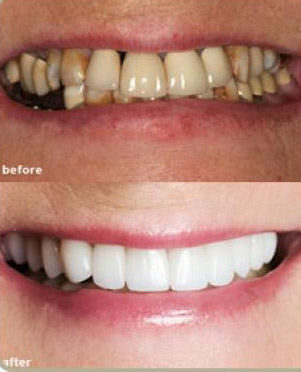
Dentures

Dentures, also known as false teeth, are prosthetic devices constructed to replace missing teeth; they are supported by the surrounding soft and hard tissues of the oral cavity. Conventional dentures are removable (removable partial denture or complete denture). However, there are many denture designs, some which rely on bonding or clasping onto teeth or dental implants (fixed prosthodontics). There are two main categories of dentures, the distinction being whether they are used to replace missing teeth on the mandibular arch or on the maxillary arch.
Causes of tooth loss Patients can become entirely edentulous (without teeth) for many reasons, the most prevalent being removal because of dental disease typically relating to oral flora control, i.e., periodontal disease and tooth decay. Other reasons include tooth developmental defects caused by severe malnutrition, genetic defects such as dentinogenesis imperfecta, trauma, or drug use.
Advantages
Dentures can help patients through: Mastication, as chewing ability is improved by replacing edentulous areas with denture teeth.
Aesthetics, because the presence of teeth gives a natural appearance to the face, and wearing a denture to replace missing teeth provides support for the lips and cheeks and corrects the collapsed appearance that results from the loss of teeth.
Pronunciation, because replacing missing teeth, especially the anteriors, enables patients to speak better. There is especially improvement in pronouncing words containing sibilants or fricatives.
Self-esteem, because improved looks and speech boost confidence in the ability to interact socially.
